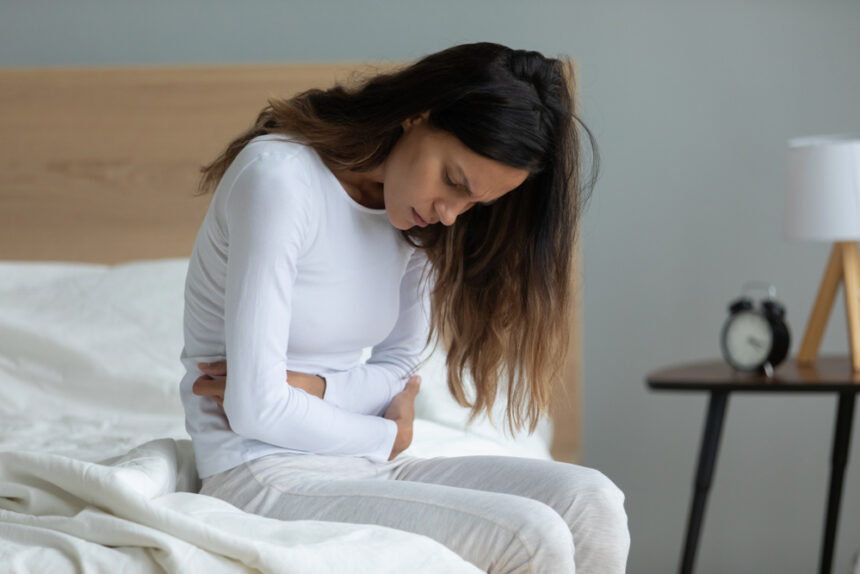
It is known that certain risk factors, such as anxiety, can lead to persistent gut symptoms in individuals who have had COVID-19 or specific bacterial infections.
Published on July 16th in Gut, a review and meta-analysis revealed that 14.5 percent of individuals who had gastroenteritis developed irritable bowel syndrome (IBS), while 13 percent experienced functional dyspepsia, also known as chronic heartburn, from a group of 14,446 people.
Among those with IBS, symptoms persisted for one to four years in 52 percent of the population in three studies, and for over five years in 40 percent of participants in four studies. IBS symptoms include stomach pain, bloating, and irregular bowel habits such as chronic constipation, diarrhea, or both.
Furthermore, individuals who had gastroenteritis were over four times more likely to develop IBS and three times more likely to develop dyspepsia compared to those who did not have gastroenteritis.
Implicated Bacteria
The researchers noted that while the causes of IBS and dyspepsia are not fully understood, approximately 179 million people worldwide experience gastroenteritis annually. These infections are often caused by a viral stomach bug or food poisoning, which can be due to bacteria, parasites, viruses, or other toxins.
The connection between IBS/dyspepsia and gastroenteritis, especially concerning more aggressive and pro-inflammatory bacteria and the virus responsible for COVID-19, is crucial information for healthcare professionals treating patients with ongoing symptoms following a recent gastroenteritis infection.
Disorders like IBS and chronic heartburn are sometimes seen as primarily psychological conditions by healthcare professionals, potentially leading to underestimation of patients’ complaints and expectations, as noted by the authors of the study.
“Generally, as acute gastroenteritis is a common disorder worldwide, our findings may be relevant for public health, and physicians should pay heed if their patients present with a recent episode of infectious gastroenteritis,” the study mentioned.
The study identified parasites as the cause of gastroenteritis in 30 percent of cases, bacteria in 18 percent, and viruses in nearly 11 percent.
Individuals who had the highest incidence of IBS following gastroenteritis were those with Campylobacter bacterial infections causing diarrhea. Additionally, individuals infected with SARS-CoV-2, the virus responsible for COVID-19, or parasites were five times more likely to develop IBS.
A Prolonged Story
A study published in 2010 in Gut, which followed 742 individuals to investigate the long-term effects of acute gastroenteritis, observed a similar pattern. These subjects were part of a municipal water contamination outbreak. Eight years after the initial assessment, over 28 percent of the subjects still experienced IBS after two to three years, and 15.4 percent had IBS after eight years.
The link between campylobacter and post-infectious IBS (PI-IBS) is well established, although it may not be widely known among clinicians, according to Dr. Madhusudan (Madhu) Grover, a gastroenterologist and researcher at Mayo Clinic.
“Individuals who developed IBS might have struggled to overcome post-infectious dysbiosis,” the study highlighted. “Finally, psychological factors such as stress, anxiety, and depression are also considered predisposing factors for post-COVID-19 IBS.”
The risk factors identified in this research were: being female, the severity of COVID-19, the presence of acute gastrointestinal symptoms, and depression/anxiety.
Specific Individuals at Higher Risk
Similar risk factors were observed in the recent review and meta-analysis. Specific risk factors for developing IBS after a stomach bug included being female, experiencing diarrhea lasting more than three weeks, and having a history of anxiety. The latter was associated with a three-fold risk.
Reducing Risks
The University of Chicago Medicine recommends the following strategies for managing stress and anxiety:
- Engage in regular physical activity; avoid prolonged periods of sitting
- Practice relaxation techniques such as breathing exercises
- Take short breaks, especially during stressful situations
- Get seven hours of sleep per night
- Consume whole foods rather than processed foods
- Avoid or limit alcohol consumption
- Socialize and spend time with others
- Connect with nature
- Practice meditation
- Talk to a friend, therapist, or social worker about stressors
Some precautions can also help reduce the risk of stomach bugs. Regular handwashing can reduce up to 47 percent of gastroenteritis cases, as indicated by a 2003 review in The Lancet. Additionally, following safe food preparation guidelines for handling, storing, and cooking raw foods can help minimize contamination.





